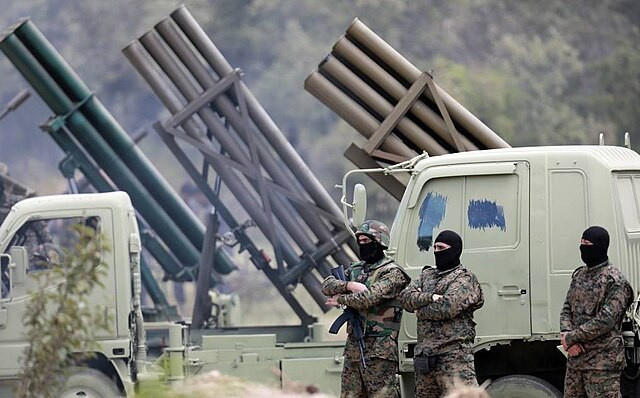The ongoing conflict between Israel and Hezbollah has intensified dramatically over the past 48 hours, marking the most significant exchange of fire between the two sides since the war in Gaza began. Hezbollah launched a barrage of rockets deep into northern Israel, striking areas near the city of Haifa in a rare and escalating move. In response, Israel conducted nearly 300 strikes on Hezbollah positions in Lebanon, with the Israeli military framing these operations as a preemptive action against a planned Hezbollah attack.
The situation escalated after a devastating Israeli airstrike on southern Beirut on Friday that killed at least 45 people, including senior Hezbollah commander Ibrahim Aqil and other high-ranking operatives. Aqil was a top figure in Hezbollah's elite Radwan Force, and his death is considered a major blow to the group. The airstrike came after two days of explosions targeting pagers and walkie-talkies used by Hezbollah, leaving dozens dead and signaling a significant escalation in the conflict.
The strikes from Hezbollah have been the deepest into Israeli territory since the 2006 Israel-Lebanon war, with rockets landing in areas like Kiryat Bialik, Tsur Shalom, and Moreshet near the port city of Haifa. Hezbollah claims these attacks were in retaliation for the deaths of civilians and military personnel caused by Israeli airstrikes in Lebanon. "This is just the beginning of an open-ended battle," said Naim Qassem, Hezbollah's second-in-command, during a speech at the funeral of Ibrahim Aqil.
Despite Hezbollah's aggressive actions, Israeli President Isaac Herzog emphasized on Sunday that Israel does not seek a full-scale war with Lebanon. "We are not interested in war with Lebanon. Hezbollah is responsible for this escalation," Herzog said, reaffirming Israel's focus on ensuring the safety of its citizens in the north. However, with thousands of rockets already fired and casualties mounting, both sides appear locked in a perilous cycle of retaliation.
The series of strikes have forced schools in northern Israel to close and gatherings in the region have been restricted under new safety guidelines. Many Israelis living near the border have been evacuated, and residents of southern Lebanon are also fleeing the crossfire. The Israeli government has made it clear that the safety of its northern citizens is a key military objective, with Prime Minister Benjamin Netanyahu stating, "We are determined to return our citizens in the north to their homes safely."
Lebanon's Health Ministry reported that 68 people were wounded in Friday's airstrike in southern Beirut, with 15 still in critical condition. Hezbollah's media office escorted journalists to the scene, where rescue workers continued to search through the rubble of an eight-story building that was destroyed. The building had been hosting a meeting of Hezbollah officials in the basement, which is believed to have been the primary target.
The escalation comes at a time when regional tensions are already high, with the war in Gaza fueling further conflict along Israel's northern border. Since the outbreak of hostilities between Israel and Hamas, Hezbollah has ramped up its cross-border attacks in solidarity with Palestinian forces. The fear of a broader regional conflict is growing, with many experts warning that Hezbollah's increased rocket fire and Israel's robust military response could trigger a full-scale war.
While Hezbollah's leadership has previously indicated a reluctance to fully engage in an all-out conflict, recent developments may be changing the calculus. The group, already weakened by the destruction of its communication systems and the loss of key leaders, is feeling the pressure to maintain its position as a dominant force in Lebanon and the broader region. According to analysts, Hezbollah's latest actions suggest that it may no longer be willing to de-escalate unless significant progress is made toward a ceasefire in Gaza.
The White House has called for restraint on both sides, with National Security Adviser Jake Sullivan emphasizing the need for diplomatic efforts to prevent further escalation. "We remain hopeful that diplomacy can prevent this from becoming an all-out war," Sullivan said on Sunday. The U.S. State Department has also urged American citizens to leave Lebanon while commercial flights are still available, citing the unpredictable nature of the conflict.
Despite efforts from international actors to mediate, the situation remains highly volatile. Hezbollah has vowed continued retaliation for the deaths of its operatives, while Israel has signaled that it will not back down from defending its northern border. As cross-border attacks intensify, fears are mounting that the region could slide into a broader and more destructive war, with devastating consequences for both Israel and Lebanon.




